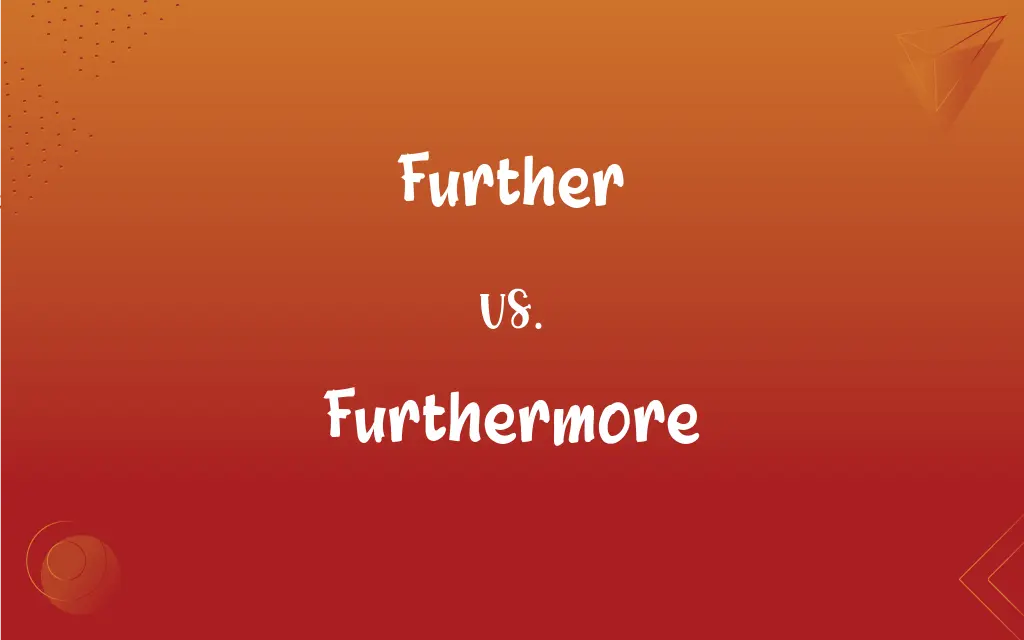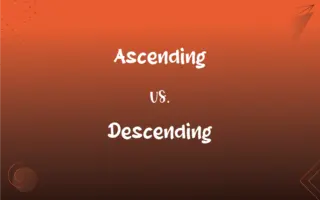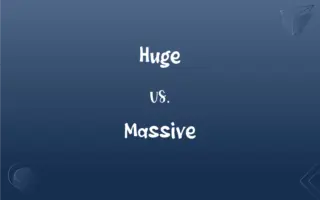Further vs. Furthermore: What's the Difference?
Edited by Janet White || By Harlon Moss || Published on November 26, 2023
"Further" can refer to distance or advancement, while "furthermore" is an adverb meaning "in addition" or "moreover."

Key Differences
"Further" and "furthermore" are both words that imply progression or addition, but they're used in different contexts and have unique nuances. Their roots are grounded in the idea of moving or extending beyond a certain point, yet they serve distinct purposes in sentences.
"Further" is a versatile word. It can act as an adjective, adverb, or even a verb. As an adjective, it describes a greater distance or degree, as in "the further end of the room." As an adverb, it can mean "to a greater extent," like in "I'll look further into the matter." When used as a verb, "further" means to help advance something, as in "to further a cause."
"Furthermore," on the other hand, is strictly an adverb. It's employed to introduce additional information or to emphasize a point, often synonymous with "moreover" or "in addition." For instance, "I don't want to go to the party. Furthermore, I wasn't even invited." In this sense, "furthermore" adds weight to the argument or statement being made.
While both words share the concept of addition or advancement, they differ in application. "Further" tends to be more about advancement in terms of distance, depth, or support, while "furthermore" concerns itself with supplementing or emphasizing information. Context is key in deciding which word is appropriate to use.
In understanding these words, it's crucial to recognize their respective functionalities in a sentence. "Further" often requires context to determine its precise meaning, whereas "furthermore" is a clear indicator of added information or an emphasized point.
ADVERTISEMENT
Comparison Chart
Part of Speech
Adjective, Adverb, Verb
Adverb
Meaning
Greater distance, extent; to promote
In addition, moreover
Usage
Describes advancement or promotion
Introduces additional information or emphasis
Example Sentence
"He moved further away."
"She's busy; furthermore, she's not interested."
Synonyms
More, deeper, beyond
Moreover, additionally, also
ADVERTISEMENT
Further and Furthermore Definitions
Further
In addition to what's already been done.
Can you elucidate further on this topic?
Furthermore
In addition to what's been said.
I'm tired; furthermore, it's late.
Further
To a more advanced level.
He wants to take his studies further.
Furthermore
Enhancing or supporting an argument.
The data is incomplete. Furthermore, it's outdated.
Further
Supporting or promoting.
This will further our efforts in the project.
Furthermore
Moreover; emphasizing a point.
The book is expensive; furthermore, it's not even useful.
Further
Beyond a given point.
No further questions were asked.
Furthermore
Serving as a further reason or justification.
I don't want to travel. Furthermore, the weather is bad.
Further
To a greater distance.
The mountains are further than they appear.
Furthermore
Also; introducing supplementary information.
She's an excellent researcher. Furthermore, she's a great lecturer.
Further
More distant in degree, time, or space
A result that was further from our expectations than last time.
The further lamppost.
Furthermore
In addition; moreover.
Further
Additional
A further example.
A further delay.
Furthermore
In addition; besides; further; what's more (i.e. to denote additional information).
He skillfully took charge of the event, and furthermore, he stayed late after it to clean up.
Furthermore
Or conj. Moreover; besides; in addition to what has been said.
Furthermore
In addition;
Computer chess games are getting cheaper all the time; furthermore, their quality is improving
The cellar was dark; moreover, mice nested there
What is more, there's no sign of a change
FAQs
Can "further" be used as a verb?
Yes, "further" can mean to promote or advance, as in "She furthered her education."
Is "further" always about physical distance?
No, "further" can also mean "additional" or "to a greater extent."
Is "furthermore" synonymous with "moreover"?
Yes, "furthermore" is often used in the same way as "moreover" to add emphasis or information.
Where in a sentence is "furthermore" typically placed?
"Furthermore" is often placed at the beginning of a sentence to introduce additional information.
Does "furthermore" always follow a semicolon?
Not necessarily, but it's common to use "furthermore" after a semicolon or period.
Can "furthermore" start a paragraph?
Yes, it's common to start a paragraph with "furthermore" to introduce supplementary points.
Is there a difference between "further" and "farther"?
Yes, while both can indicate distance, "further" often has abstract meanings, and "farther" is usually about physical distance.
Can "further" describe a degree or extent?
Yes, like in "He is further convinced of the theory."
Can "furthermore" be replaced with "and"?
Not always. "Furthermore" adds weight or emphasizes an additional point more than "and" does.
Is "furthermore" redundant if "also" is used in the same sentence?
It can be. Using both might emphasize the addition but could sound repetitive.
Can "further" mean "in addition"?
Yes, "further" can mean "moreover" or "in addition," similar to "furthermore."
Is "furthermore" formal?
"Furthermore" is often considered more formal and is common in academic and professional writing.
Is it correct to say "further to our conversation"?
Yes, it means "in relation to our previous conversation."
Is "further" used in academic writing?
Yes, "further research" or "further evidence" are common phrases.
How can "further" be used in a sentence?
"Further" can indicate distance, as in "The town is further than I thought."
Is "furthermore" ever used in casual conversation?
It can be, but it's less common in casual contexts than in formal writing.
How does "furthermore" differ from "in addition"?
They're similar, but "furthermore" often emphasizes or strengthens the additional point.
Can "further" mean "promote"?
Yes, as in "to further a cause" or "furthering one's career."
Should "furthermore" always be followed by a comma?
Typically, yes. It's used to transition and introduce additional information, so a comma helps indicate that pause.
Should "further" always be followed by "than" when indicating distance?
Not necessarily. It can stand alone, as in "I can't walk any further."
About Author
Written by
Harlon MossHarlon is a seasoned quality moderator and accomplished content writer for Difference Wiki. An alumnus of the prestigious University of California, he earned his degree in Computer Science. Leveraging his academic background, Harlon brings a meticulous and informed perspective to his work, ensuring content accuracy and excellence.
Edited by
Janet WhiteJanet White has been an esteemed writer and blogger for Difference Wiki. Holding a Master's degree in Science and Medical Journalism from the prestigious Boston University, she has consistently demonstrated her expertise and passion for her field. When she's not immersed in her work, Janet relishes her time exercising, delving into a good book, and cherishing moments with friends and family.






































































